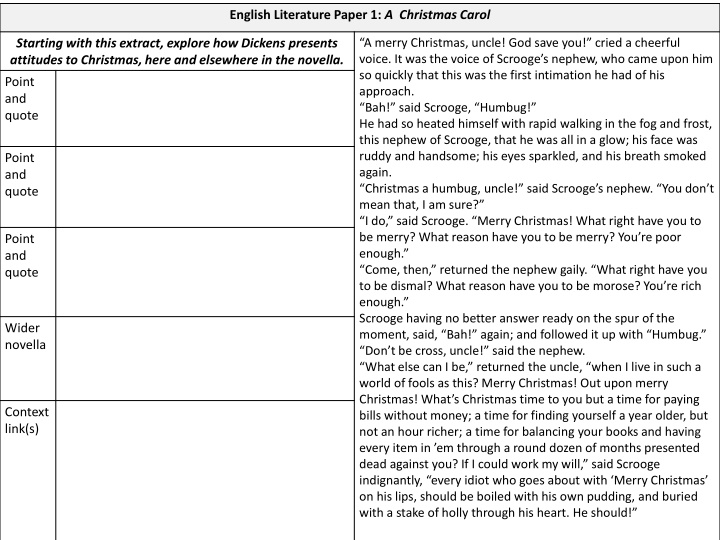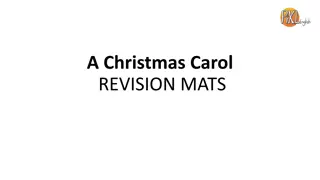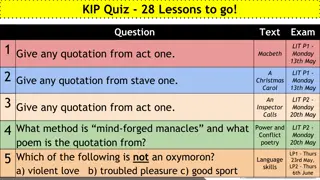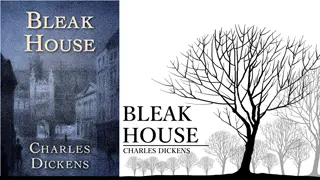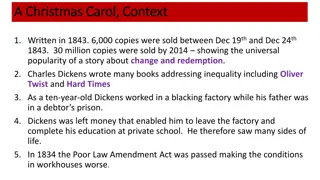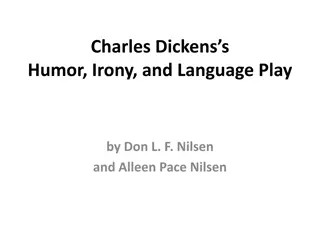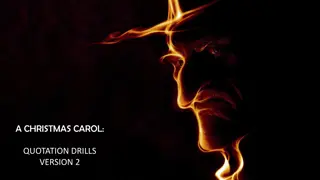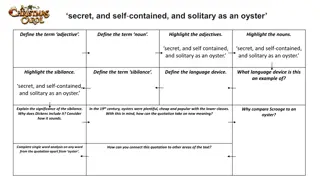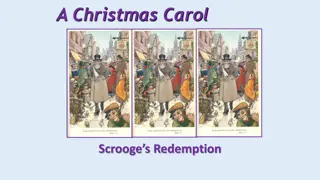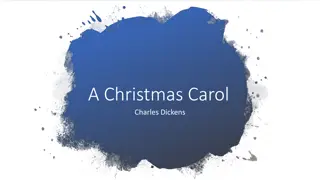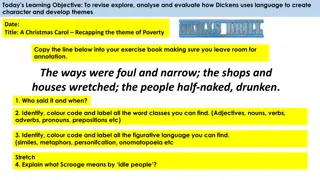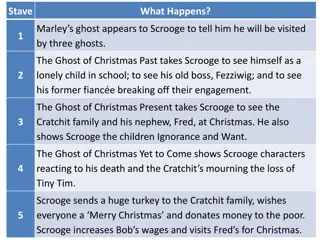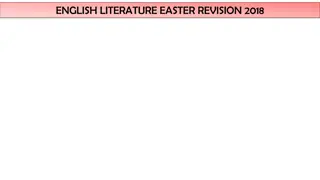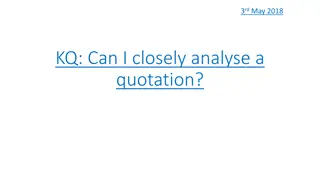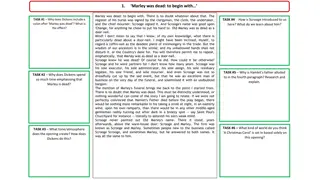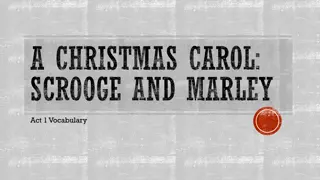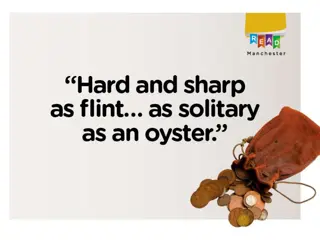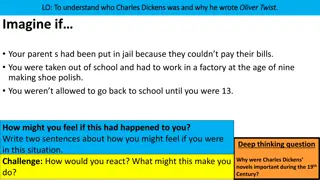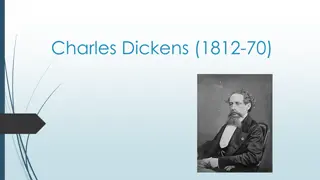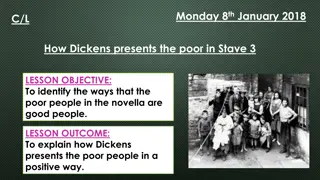Analysis of Attitudes and Ideas in "A Christmas Carol" by Charles Dickens
Explore Dickens' presentation of attitudes towards Christmas and ideas about working life in "A Christmas Carol." Scrooge's nephew challenges his uncle's grim perspective on Christmas, emphasizing the joy of the season despite financial circumstances. Further, Scrooge reflects on the impact of generosity and happiness over material wealth in a poignant moment with the Ghost. This analysis delves into contrasting viewpoints and the broader themes of the novella.
Download Presentation

Please find below an Image/Link to download the presentation.
The content on the website is provided AS IS for your information and personal use only. It may not be sold, licensed, or shared on other websites without obtaining consent from the author.If you encounter any issues during the download, it is possible that the publisher has removed the file from their server.
You are allowed to download the files provided on this website for personal or commercial use, subject to the condition that they are used lawfully. All files are the property of their respective owners.
The content on the website is provided AS IS for your information and personal use only. It may not be sold, licensed, or shared on other websites without obtaining consent from the author.
E N D
Presentation Transcript
English Literature Paper 1: A Christmas Carol A merry Christmas, uncle! God save you! cried a cheerful voice. It was the voice of Scrooge s nephew, who came upon him so quickly that this was the first intimation he had of his approach. Bah! said Scrooge, Humbug! He had so heated himself with rapid walking in the fog and frost, this nephew of Scrooge, that he was all in a glow; his face was ruddy and handsome; his eyes sparkled, and his breath smoked again. Christmas a humbug, uncle! said Scrooge s nephew. You don t mean that, I am sure? I do, said Scrooge. Merry Christmas! What right have you to be merry? What reason have you to be merry? You re poor enough. Come, then, returned the nephew gaily. What right have you to be dismal? What reason have you to be morose? You re rich enough. Scrooge having no better answer ready on the spur of the moment, said, Bah! again; and followed it up with Humbug. Don t be cross, uncle! said the nephew. What else can I be, returned the uncle, when I live in such a world of fools as this? Merry Christmas! Out upon merry Christmas! What s Christmas time to you but a time for paying bills without money; a time for finding yourself a year older, but not an hour richer; a time for balancing your books and having every item in em through a round dozen of months presented dead against you? If I could work my will, said Scrooge indignantly, every idiot who goes about with Merry Christmas on his lips, should be boiled with his own pudding, and buried with a stake of holly through his heart. He should! Starting with this extract, explore how Dickens presents attitudes to Christmas, here and elsewhere in the novella. Point and quote Point and quote Point and quote Wider novella Context link(s)
English Literature Paper 1: A Christmas Carol His heart and soul were in the scene, and with his former self. He corroborated everything, remembered everything, enjoyed everything, and underwent the strangest agitation. It was not until now, when the bright faces of his former self and Dick were turned from them, that he remembered the Ghost, and became conscious that it was looking full upon him, while the light upon its head burnt very clear. "A small matter," said the Ghost, "to make these silly folks so full of gratitude." "Small!" echoed Scrooge. The Spirit signed to him to listen to the two apprentices, who were pouring out their hearts in praise of Fezziwig: and when he had done so, said, "Why! Is it not! He has spent but a few pounds of your mortal money: three or four perhaps. Is that so much that he deserves this praise?" "It isn't that," said Scrooge, heated by the remark, and speaking unconsciously like his former, not his latter, self. "It isn't that, Spirit. He has the power to render us happy or unhappy; to make our service light or burdensome; a pleasure or a toil. Say that his power lies in words and looks; in things so slight and insignificant that it is impossible to add and count them up: what then? The happiness he gives, is quite as great as if it cost a fortune." He felt the Spirit's glance, and stopped. "What is the matter?" asked the Ghost. "Nothing in particular," said Scrooge. "Something, I think?" the Ghost insisted. "No," said Scrooge, "No. I should like to be able to say a word or two to my clerk just now! That's all." Starting with this extract, explore how Dickens presents ideas about working life, here and elsewhere in the novella. Point and quote Point and quote Point and quote Wider novella Context link(s)
English Literature Paper 1: A Christmas Carol Scrooge was the Ogre of the family. The mention of his name cast a dark shadow on the party, which was not dispelled for full five minutes. After it had passed away, they were ten times merrier than before, from the mere relief of Scrooge the Baleful being done with. Bob Cratchit told them how he had a situation in his eye for Master Peter, which would bring in, if obtained, full five-and-sixpence weekly. The two young Cratchits laughed tremendously at the idea of Peter's being a man of business; and Peter himself looked thoughtfully at the fire from between his collars, as if he were deliberating what particular investments he should favour when he came into the receipt of that bewildering income. Martha, who was a poor apprentice at a milliner's, then told them what kind of work she had to do, and how many hours she worked at a stretch, and how she meant to lie abed to-morrow morning for a good long rest; to-morrow being a holiday she passed at home. Also how she had seen a countess and a lord some days before, and how the lord was much about as tall as Peter; at which Peter pulled up his collars so high that you couldn't have seen his head if you had been there. All this time the chestnuts and the jug went round and round; and by- and-bye they had a song, about a lost child travelling in the snow, from Tiny Tim, who had a plaintive little voice, and sang it very well indeed. There was nothing of high mark in this. They were not a handsome family; they were not well dressed; their shoes were far from being water-proof; their clothes were scanty; and Peter might have known, and very likely did, the inside of a pawnbroker's. But, they were happy, grateful, pleased with one another, and contented with the time; and when they faded, and looked happier yet in the bright sprinklings of the Spirit's torch at parting, Scrooge had his eye upon them, and especially on Tiny Tim, until the last. Starting with this extract, explore how Dickens presents ideas about poverty, here and elsewhere in the novella. Point and quote Point and quote Point and quote Wider novella Context link(s)
English Literature Paper 1: A Christmas Carol Forgive me if I am not justified in what I ask, said Scrooge, looking intently at the Spirit s robe, but I see something strange, and not belonging to yourself, protruding from your skirts. Is it a foot or a claw? It might be a claw, for the flesh there is upon it, was the Spirit s sorrowful reply. Look here. From the foldings of its robe, it brought two children; wretched, abject, frightful, hideous, miserable. They knelt down at its feet, and clung upon the outside of its garment. Oh, Man! look here. Look, look, down here! exclaimed the Ghost. They were a boy and girl. Yellow, meagre, ragged, scowling, wolfish; but prostrate, too, in their humility. Where graceful youth should have filled their features out, and touched them with its freshest tints, a stale and shrivelled hand, like that of age, had pinched, and twisted them, and pulled them into shreds. Where angels might have sat enthroned, devils lurked, and glared out menacing. No change, no degradation, no perversion of humanity, in any grade, through all the mysteries of wonderful creation, has monsters half so horrible and dread. Scrooge started back, appalled. Having them shown to him in this way, he tried to say they were fine children, but the words choked themselves, rather than be parties to a lie of such enormous magnitude. Spirit! are they yours? Scrooge could say no more. They are Man s, said the Spirit, looking down upon them. And they cling to me, appealing from their fathers. This boy is Ignorance. This girl is Want. Beware them both, and all of their degree, but most of all beware this boy, for on his brow I see that written which is Doom, unless the writing be erased. Deny it! cried the Spirit, stretching out its hand towards the city. Slander those who tell it ye! Admit it for your factious purposes, and make it worse. And bide the end! Starting with this extract, explore how Dickens presents children, here and elsewhere in the novella. Point and quote Point and quote Point and quote Wider novella Context link(s)
English Literature Paper 1: A Christmas Carol Starting with this extract, explore how Dickens presents the spirits, here and elsewhere in the novella. The Phantom slowly, gravely, silently approached. When it came, Scrooge bent down upon his knee; for in the very air through which this Spirit moved it seemed to scatter gloom and mystery. It was shrouded in a deep black garment, which concealed its head, its face, its form, and left nothing of it visible save one outstretched hand. But for this it would have been difficult to detach its figure from the night, and separate it from the darkness by which it was surrounded. He felt that it was tall and stately when it came beside him, and that its mysterious presence filled him with a solemn dread. He knew no more, for the Spirit neither spoke nor moved. "I am in the presence of the Ghost of Christmas Yet To Come?" said Scrooge. The Spirit answered not, but pointed downward with its hand. "You are about to show me shadows of the things that have not happened, but will happen in the time before us," Scrooge pursued. "Is that so, Spirit?" The upper portion of the garment was contracted for an instant in its folds, as if the Spirit had inclined its head. That was the only answer he received. Although well used to ghostly company by this time, Scrooge feared the silent shape so much that his legs trembled beneath him, and he found that he could hardly stand when he prepared to follow it. The Spirit pauses a moment, as observing his condition, and giving him time to recover. But Scrooge was all the worse for this. It thrilled him with a vague uncertain horror, to know that behind the dusky shroud there were ghostly eyes intently fixed upon him, while he, though he stretched his own to the utmost, could see nothing but a spectral hand and one great heap of black. Point and quote Point and quote Point and quote Wider novella Context link(s)
English Literature Paper 1: A Christmas Carol Starting with this extract, explore how Dickens presents the character of Fred, Scrooge s nephew, here and elsewhere. "A merry Christmas, uncle! God save you!" cried a cheerful voice. It was the voice of Scrooge's nephew, who came upon him so quickly that this was the first intimation he had of his approach. "Bah!" said Scrooge, "Humbug!" He had so heated himself with rapid walking in the fog and frost, this nephew of Scrooge's, that he was all in a glow; his face was ruddy and handsome; his eyes sparkled, and his breath smoked again. Point and quote Point and quote * * * * * * * * * * * * "There are many things from which I might have derived good, by which I have not profited, I dare say," returned the nephew. "Christmas among the rest. But I am sure I have always thought of Christmas time, when it has come round -- apart from the veneration due to its sacred name and origin, if anything belonging to it can be apart from that -- as a good time: a kind, forgiving, charitable, pleasant time: the only time I know of, in the long calendar of the year, when men and women seem by one consent to open their shut-up hearts freely, and to think of people below them as if they really were fellow-passengers to the grave, and not another race of creatures bound on other journeys. And therefore, uncle, though it has never put a scrap of gold or silver in my pocket, I believe that it has done me good, and will do me good; and I say, God bless it!" Point and quote Wider novella Context link(s)
English Literature Paper 1: A Christmas Carol Starting with this extract, explore how Dickens presents attitudes to poverty, here and elsewhere in the novella. "At this festive season of the year, Mr. Scrooge," said the gentleman, taking up a pen, "it is more than usually desirable that we should make some slight provision for the Poor and Destitute, who suffer greatly at the present time. Many thousands are in want of common necessaries; hundreds of thousands are in want of common comforts, sir." Point and quote "Are there no prisons?" asked Scrooge. "Plenty of prisons," said the gentleman, laying down the pen again. "And the Union workhouses?" demanded Scrooge. "Are they still in operation?" "They are. Still," returned the gentleman, "I wish I could say they were not." "The Treadmill and the Poor Law are in full vigour, then?" said Scrooge. "Both very busy, sir." "Oh! I was afraid, from what you said at first, that something had occurred to stop them in their useful course," said Scrooge. "I'm very glad to hear it." Point and quote Point and quote Wider novella "Under the impression that they scarcely furnish Christian cheer of mind or body to the multitude," returned the gentleman, "a few of us are endeavouring to raise a fund to buy the Poor some meat and drink and means of warmth. We choose this time, because it is a time, of all others, when Want is keenly felt, and Abundance rejoices. What shall I put you down for?" Context link(s) "Nothing!" Scrooge replied.
Starting with this extract, explore how Dickens presents the Cratchits, here and elsewhere in the novella. And perhaps it was the pleasure the good Spirit had in showing off this power of his, or else it was his own kind, generous, hearty nature, and his sympathy with all poor men, that led him straight to Scrooge's clerk's; for there he went, and took Scrooge with him, holding to his robe; and on the threshold of the door the Spirit smiled, and stopped to bless Bob Cratchit's dwelling with the sprinkling of his torch. Think of that. Bob had but fifteen bob a-week himself; he pocketed on Saturdays but fifteen copies of his Christian name; and yet the Ghost of Christmas Present blessed his four-roomed house. Point and quote Point and quote Then up rose Mrs Cratchit, Cratchit's wife, dressed out but poorly in a twice-turned gown, but brave in ribbons, which are cheap and make a goodly show for sixpence; and she laid the cloth, assisted by Belinda Cratchit, second of her daughters, also brave in ribbons; while Master Peter Cratchit plunged a fork into the saucepan of potatoes, and getting the corners of his monstrous shirt collar (Bob's private property, conferred upon his son and heir in honour of the day) into his mouth, rejoiced to find himself so gallantly attired, and yearned to show his linen in the fashionable Parks. And now two smaller Cratchits, boy and girl, came tearing in, screaming that outside the baker's they had smelt the goose, and known it for their own; and basking in luxurious thoughts of sage and onion, these young Cratchits danced about the table, and exalted Master Peter Cratchit to the skies, while he (not proud, although his collars nearly choked him) blew the fire, until the slow potatoes bubbling up, knocked loudly at the saucepan-lid to be let out and peeled. Point and quote Wider novella Context link(s)
English Literature Paper 1: A Christmas Carol Man of the worldly mind! replied the Ghost, do you believe in me or not? I do, said Scrooge. I must. But why do spirits walk the earth, and why do they come to me? It is required of every man, the Ghost returned, that the spirit within him should walk abroad among his fellowmen, and travel far and wide; and if that spirit goes not forth in life, it is condemned to do so after death. It is doomed to wander through the world oh, woe is me! and witness what it cannot share, but might have shared on earth, and turned to happiness! Again the spectre raised a cry, and shook its chain and wrung its shadowy hands. You are fettered, said Scrooge, trembling. Tell me why? I wear the chain I forged in life, replied the Ghost. I made it link by link, and yard by yard; I girded it on of my own free will, and of my own free will I wore it. Is its pattern strange to you? Scrooge trembled more and more. Or would you know, pursued the Ghost, the weight and length of the strong coil you bear yourself? It was full as heavy and as long as this, seven Christmas Eves ago. You have laboured on it, since. It is a ponderous chain! Scrooge glanced about him on the floor, in the expectation of finding himself surrounded by some fifty or sixty fathoms of iron cable: but he could see nothing. Jacob, he said, imploringly. Old Jacob Marley, tell me more. Speak comfort to me, Jacob! I have none to give, the Ghost replied. It comes from other regions, Ebenezer Scrooge, and is conveyed by other ministers, to other kinds of men. Nor can I tell you what I would. A very little more is all permitted to me. I cannot rest, I cannot stay, I cannot linger anywhere. My spirit never walked beyond our counting-house mark me! in life my spirit never roved beyond the narrow limits of our money-changing hole; and weary journeys lie before me! Starting with this extract, explore how Dickens presents ideas of damnation in the novella. Point and quote Point and quote Point and quote Wider novella Context link(s)
English Literature Paper 1: A Christmas Carol Again Scrooge saw himself. He was older now; a man in the prime of life. His face had not the harsh and rigid lines of later years; but it had begun to wear the signs of care and avarice. There was an eager, greedy, restless motion in the eye, which showed the passion that had taken root, and where the shadow of the growing tree would fall. He was not alone, but sat by the side of a fair young girl in a mourning-dress: in whose eyes there were tears, which sparkled in the light that shone out of the Ghost of Christmas Past. It matters little, she said, softly. To you, very little. Another idol has displaced me; and if it can cheer and comfort you in time to come, as I would have tried to do, I have no just cause to grieve. What Idol has displaced you? he rejoined. A golden one. This is the even-handed dealing of the world! he said. There is nothing on which it is so hard as poverty; and there is nothing it professes to condemn with such severity as the pursuit of wealth! You fear the world too much, she answered, gently. All your other hopes have merged into the hope of being beyond the chance of its sordid reproach. I have seen your nobler aspirations fall off one by one, until the master-passion, Gain, engrosses you. Have I not? What then? he retorted. Even if I have grown so much wiser, what then? I am not changed towards you. She shook her head. Am I? Our contract is an old one. It was made when we were both poor and content to be so, until, in good season, we could improve our worldly fortune by our patient industry. You are changed. When it was made, you were another man. Starting with this extract, explore how Dickens presents ideas about greed in the novella. Point and quote Point and quote Point and quote Wider novella Context link(s)
English Literature Paper 1: A Christmas Carol Why, it s Ali Baba! Scrooge exclaimed in ecstasy. It s dear old honest Ali Baba! Yes, yes, I know! One Christmas time, when yonder solitary child was left here all alone, he did come, for the first time, just like that. Poor boy! And Valentine, said Scrooge, and his wild brother, Orson; there they go! And what s his name, who was put down in his drawers, asleep, at the Gate of Damascus; don t you see him! And the Sultan s Groom turned upside down by the Genii; there he is upon his head! Serve him right. I m glad of it. What business had he to be married to the Princess! Starting with this extract, explore how Dickens presents Scrooge s transformation in the novella. Point and quote Point and quote To hear Scrooge expending all the earnestness of his nature on such subjects, in a most extraordinary voice between laughing and crying; and to see his heightened and excited face; would have been a surprise to his business friends in the city, indeed. There s the Parrot! cried Scrooge. Green body and yellow tail, with a thing like a lettuce growing out of the top of his head; there he is! Poor Robin Crusoe, he called him, when he came home again after sailing round the island. Poor Robin Crusoe, where have you been, Robin Crusoe? The man thought he was dreaming, but he wasn t. It was the Parrot, you know. There goes Friday, running for his life to the little creek! Halloa! Hoop! Halloo! Then, with a rapidity of transition very foreign to his usual character, he said, in pity for his former self, Poor boy! and cried again. I wish, Scrooge muttered, putting his hand in his pocket, and looking about him, after drying his eyes with his cuff: but it s too late now. What is the matter? asked the Spirit. Nothing, said Scrooge. Nothing. There was a boy singing a Christmas Carol at my door last night. I should like to have given him something: that s all. The Ghost smiled thoughtfully, and waved its hand: saying as it did so, Let us see another Christmas! Point and quote Wider novella Context link(s)
English Literature Paper 1: A Christmas Carol "At this festive season of the year, Mr. Scrooge," said the gentleman, taking up a pen, "it is more than usually desirable that we should make some slight provision for the Poor and Destitute, who suffer greatly at the present time. Many thousands are in want of common necessaries; hundreds of thousands are in want of common comforts, sir." Starting with this extract, explore how Dickens presents Scrooge as a cold, selfish character in the novella. Point and quote "Are there no prisons?" asked Scrooge. "Plenty of prisons," said the gentleman, laying down the pen again. "And the Union workhouses?" demanded Scrooge. "Are they still in operation?" "They are. Still," returned the gentleman, "I wish I could say they were not." "The Treadmill and the Poor Law are in full vigour, then?" said Scrooge. "Both very busy, sir." "Oh! I was afraid, from what you said at first, that something had occurred to stop them in their useful course," said Scrooge. "I'm very glad to hear it." Point and quote Point and quote Wider novella "Under the impression that they scarcely furnish Christian cheer of mind or body to the multitude," returned the gentleman, "a few of us are endeavouring to raise a fund to buy the Poor some meat and drink and means of warmth. We choose this time, because it is a time, of all others, when Want is keenly felt, and Abundance rejoices. What shall I put you down for?" Context link(s) "Nothing!" Scrooge replied.
